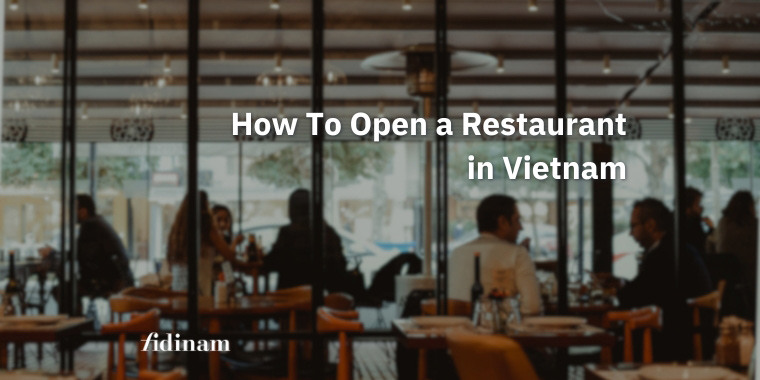
No matter how the economy fluctuates, the need for food is still an inevitable daily human need. The Vietnamese market has the potential for culinary products to cater to consumers.
In Vietnam’s big cities, more and more restaurants with foreign owners offer dishes with tastes from many different regions and countries such as France, Italy, Japan, Korea, Singapore, Thailand, China, India…
Establishing a food business in Vietnam has thus become common and growing.
According to its commitment of Vietnam in international treaties such as WTO, EVFTA, CPTPP, etc., … Vietnam allows foreign investors coming from country members of these treaties 100% to conduct the Services of catering food (CPC 642) and beverages (CPC 643).
This means Vietnam allows foreign investors to incorporate 100% foreign-owned companies doing business in the fields of restaurants.
To set up a foreign-owned company (i.e. 100% foreign-owned company or joint-venture company) (“VN Co”), the investors need to conduct the following steps:
The term of an IRC can be up to 50 years.
There is no term for the ERC.
The company is legally established on the date of the ERC
The company in Vietnam shall have at least one and may have more Legal Representative(s). One of them must be a resident of Vietnam.
If the Vietnam company has only one legal representative, and this sole Legal Representative does not stay in Vietnam, they must grant an Authorization Letter to a person in Vietnam to take over their duties under their instruction and strictly comply with the law.
In short: if the only legal representative is not a Vietnam resident, a legally authorized representative in Vietnam is required.
The VN Co's Capital Structure, which needs to be registered in the application and eventually mentioned in the IRC, includes the Charter Capital and the Long-term Loan Capital.
Charter Capital is the capital that the Investors shall pay fully to the Direct Investment Capital Account (“DICA”) opened at a licensed bank in Vietnam within 90 days as of the date of issuance of the ERC.
Long-term Loans are optional and have a duration of more than 1 year. If the Investors have plans to grant a Long-term Loan to the VN Co, it is required to include the Long-term Loan in the company incorporation application. Otherwise, no Long-term Loan is included.
In addition to IRC and ERC, the company doing business in the fields of restaurants in Vietnam must obtain and perform the following licenses and procedures.
Catering service establishments including restaurants must ensure food safety and shall bear responsibility for the safety of foods they produce and process and must obtain the Certificate of Eligibility for Food Safety before conducting the business activities.
The term of the certificate is 3 years and the re-issuance dossier must be submitted in case of expiration and continuing the production or trading activities.
Conditions for issuance of the Certificate of Eligibility for Food Safety are as follows:
During operation, if the conditions mentioned above are not satisfied, the Certificate of Eligibility for Food Safety will be revoked.
Depending on the business area, and volume, the restaurants need to comply with the regulations on fire prevention and fighting and ensure the safety conditions for fire prevention and fighting such as:
During the production process, the restaurant project must comply with regulations on waste collection and treatment, wastewater treatment, and environmental protection measures.
Restaurants that generate waste need to carry out the Environmental Registration procedure before the competent authority issues the construction permit or before waste is discharged into the environment if a construction permit is not required in accordance with regulations of law on construction.
The content of environmental registration shall cover:
However, the restaurant with an area of less than 200 square meters shall be exempt from carrying out the procedure of the Environmental Registration.
Besides, restaurants that generate domestic wastewater must pay an environmental protection fee. The fee rate is 10% of the VAT-excluded selling price of 1m3 of clean water.
Restaurants that sell alcohol with at least 5.5% alcohol by volume (ABV) for customer consumption on-premises must register with the district-level Office of Economics or Office of Economics and Infrastructure.
Selling alcohol with at least 5.5% ABV for customer consumption on-premises is only permitted when the following conditions are satisfied:
Restaurants are entitled to decide their selling prices for goods and services sold, but must list the prices in VND at the restaurant, and are not allowed to buy or sell higher than the listed prices.
With Vietnam’s strategic trade agreements, robust infrastructure, and skilled workforce, the country provides an optimal environment for global brands seeking to enhance their production capabilities and expand their reach.
To explore how you can benefit from this opportunity and successfully set up your restaurant(s) in Vietnam, contact Fidinam Vietnam today for comprehensive support and guidance throughout the whole process.
Contact us via the form below or at info@fidinam.com.vn.
All content © . All Rights Reserved.